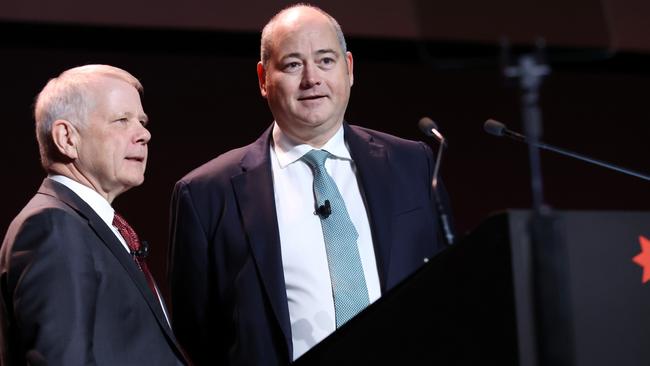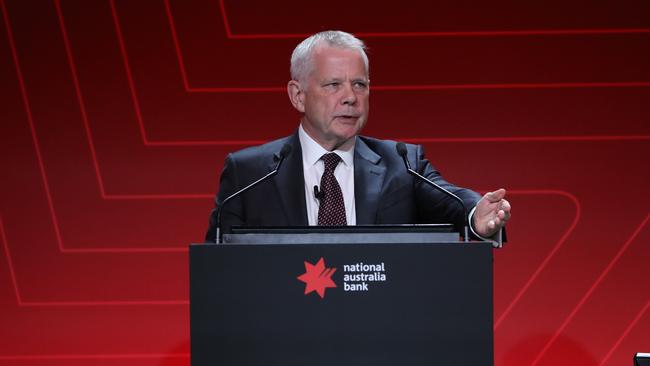NAB boss says the economy is in reasonable shape despite many bank customers facing difficulties
The boss of one of Australia’s largest banks says the Australian economy is OK and businesses are optimistic but he concedes many customers are being hammered by restrictive interest rates.

National Australia Bank chief executive Andrew Irvine says the economy is in reasonable shape and businesses remain ambitious to invest and grow despite the nation being stuck in a per capita recession for the seventh consecutive quarter.
Mr Irvine told shareholders at NAB’s annual meeting in Melbourne on Wednesday that the bank was optimistic about the longer-term outlook around the economy, as it saw business conditions as favourable and a resilient job market.
The Australian Bureau of Statistics last week reported a surprise decline in unemployment to 3.9 per cent in November.
“Restrictive interest rates are working to bring inflation into the Reserve Bank’s target range, and we do expect to see rates decrease in the first half of 2025,” Mr Irvine said.
“In the meantime, we do recognise that many customers are finding the higher cost of living challenging and we are here to help. Our message is clear: please call us and call us early.”
Mr Irvine, who replaced Ross McEwan as CEO in April, said small businesses were the heartbeat of the economy and when they succeeded, Australia also did. “That’s why we will continue to advocate for them and find solutions that help them grow,” he said. “Many of the challenges they are facing aren’t new, but new thinking is required to overcome them.
“Businesses I talk to remain ambitious. They’re eager to invest and become more productive.”
In the past four years, NAB has boosted its business lending to $155bn.
NAB’s monthly business survey for November showed that business confidence fell sharply, reversing the previous month’s gains, and is now back well below average at -3 index points. However, it is slightly higher than earlier this year.
Australian Securities & Investments Commission data reveals the nation has notched a record number of insolvencies in a calendar year, with 12,405 businesses collapsing between January and November.
A record 1442 businesses hit the wall last month, an increase of 62 per cent compared with November last year, and up 158 per cent compared with May 2022.
Mr Irvine said NAB was also continuing to work relentlessly to protect its customers and itself from criminals, adding that in the past year customers abandoned more than $170m of potential scam payments as a result of payment alerts. He said customer losses from scams had declined 20 per cent compared to the 2023 fiscal year.

In the year ahead, NAB would continue to work with government and other businesses, including telecommunications, social and digital media companies, to stop more scams.
NAB’s AGM lasted for more than four hours as the board faced questioning from several activists and shareholders over what it was doing regarding transitioning to net zero.
A resolution from more than 100 shareholders and Market Forces demanding the bank demonstrate how its fossil fuel finance aligned with global climate goals failed to gain enough support to be put to a formal vote, with 95.8 per cent against the measure.
Market Forces senior banks analyst Kyle Robertson said that, by continuing to lend money to companies developing new gas projects such as Santos, NAB was actively fuelling the climate crisis.
“The science shows that Australian agriculture is seriously threatened by climate change. Why is NAB still funding companies supercharging damage to farming businesses with coal, oil and gas expansion?” he asked.
NAB chairman Philip Chronican said transition planning for NAB’s agriculture customers would be guided in part by federal government settings and the availability of commercially viable and scalable decarbonisation solutions.
Investors were told that NAB’s total oil and gas exposure was 0.2 per cent and that it was more focused on helping customers it had greater exposure to, such as transport, in transitioning.
Mr Irvine said the bank was working closely with customers and the community on the transition to net zero and had an environment finance ambition of $80bn by 2030.
“There needs to be an orderly transition to net zero that balances the social, the economic and the environmental requirements,” he said. “We very much look forward to playing our role.”
Investors also probed NAB as to whether it remained committed to ATM machines amid a broader decline across the sector.
Mr Chronican said customers had led the decline in cash on their own as the bank faces questioning from shareholders about why there were fewer ATM machines nationwide.
He said that since 2018 there had been less need for NAB-branded ATMS as a result of the major banks removing withdrawal fees regardless of who people banked with.
“Now that you can use any of the major banks’ ATMs for free, no matter who you bank with, this means it’s become less important to have our ATM in any particular location if other banks have ATMs there,” Mr Chronican said.
“The second issue is that, particularly driven by Covid, a lot of customers moved away from using cash and moved to digital. So the combined effect means that cash withdrawals from ATMs have fallen by about 40 per cent over the last four years.”
He said NAB tracked which ATMs were being used to ensure they remained, but added that the bank had no intention to do away with ATMs and all new branches would have them.
NAB also reaffirmed its pledge to not close a busy bank branch, having invested $42m across 28 locations this year.
NAB shares fell 0.5 per cent to $37.99 on Wednesday.




To join the conversation, please log in. Don't have an account? Register
Join the conversation, you are commenting as Logout